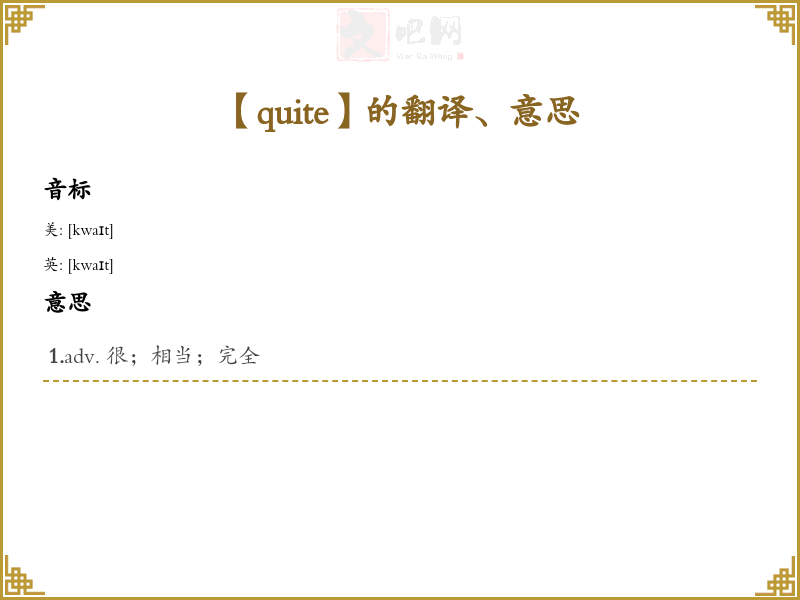【quite】的翻译、意思
时间: 2025-06-02 12:03:51
【quite】怎么读
美:[kwaɪt]
英:[kwaɪt]
【quite】是什么意思、字义解释
1. adv. 很;相当;完全
【quite】的详细解释
英文单词学*与分析:[quite]
1. 基本定义:
- 字面意思:表示“相当”、“完全”或“非常”,通常用来强调程度或程度的变化。
- 词性:副词(adverb)。
2. 词源与起源:
-
词源分析:该词源于古英语“cwita”,意为“完全”或“彻底”。它与德语的“ganz”(完整的)有相似的根源,表明一种完整性或强调。
-
历史背景:该词在中世纪英语中首次出现,最早的书面记录可以追溯到14世纪。
-
课本:在*的英语教材中,通常出现在初中和高中阶段。在牛津和美国的教材中,可能出现在中级到高级的英语学中,尤其是在日常会话和写作的上下文中。
3. 使用场景:
-
正式与非正式语境:在正式语境中,"quite"常用于学术写作或商务交流中,例如:“The results were quite significant.”(结果相当显著)。在非正式语境中,可能在日常对话中使用,例如:“I’m quite tired today.”(我今天相当累)。
-
特殊场合:在法律或科学文献中,"quite"可以用于描述证据的强度或研究结果的确定性。例如:“The evidence is quite compelling.”(证据相当有说服力)。
4. 示例句子:
-
I find this book quite fascinating.
我觉得这本书相当吸引人。 -
She was quite happy with the results of her exam.
她对考试的结果相当满意。 -
The weather is quite chilly today.
今天的天气相当寒冷。 -
He is quite skilled at playing the piano.
他弹钢琴的技巧相当高超。 -
This painting is quite beautiful.
这幅画相当美丽。
*. I’m not quite sure what to say.
我不太确定该说什么。
-
The meeting was quite productive.
会议相当富有成效。 -
It’s quite a long journey to get there.
到达那里是一段相当长的旅程。 -
She has quite a unique perspective on the issue.
她对这个问题有着相当独特的视角。 -
The movie was quite enjoyable.
这部电影相当令人愉快。
5. 同义词与反义词:
-
同义词:
- Fairly:表示“相当”,但语气较弱。
- Rather:含义接近,但有时暗示不满或惊讶。
-
反义词:
- Not at all:表示“完全不”,强调否定。
- Hardly:表示“几乎不”,通常用于否定句中。
. 学方法:
- 音标记忆法:/kwaɪt/。可以通过发音练*与“quiet”(安静)相联系,帮助记忆。
- 谐音联想记忆:可以将“quite”联想为“快点”,强调某事物的程度。
7. 关联词汇:
- Quite a bit:相当多
- Quite different:相当不同
- Quite clear:相当清楚
- Quite often:相当频繁
通过以上分析,可以更全面地理解和使用“quite”这个单词。
【quite】例句
1、[[含糊]] You use quite to indicate that something is the case to a fairly great extent. Quite is less emphatic than "very" and "extremely." 相当; 颇
-
例:I felt quite bitter about it at the time.当时我对此感到相当痛苦。
-
例:Well, actually it requires quite a bit of work and research.呃,实际上这需要相当多的工作和研究。
2、[[强调]] You use quite to emphasize what you are saying. 用于强调
-
例:It is quite clear that we were firing in self defence.非常清楚,我们当时是自卫还击。
-
例:My position is quite different.我的立场完全不同。
3、[[含糊]] You use quite after a negative to make what you are saying weaker or less definite. 用于否定词之后表示语气较弱或不确定
-
例:Something here is not quite right.这儿有什么不太对劲儿。
4、[[表赞许]] You use quite in front of a noun group to emphasize that a person or thing is very impressive or unusual. 出众的; 不同寻常的
-
例:"Oh, he's quite a character," Sean replied.“哦,他真是一个不同寻常的人。”肖恩答道。
5、[[ADV as reply]] You can say quite to express your agreement with someone. 正是这样; 可不是嘛
-
例:"It's your choice isn't it."—"Quite."“这是你的选择,不是吗?”—“可不是嘛。”
